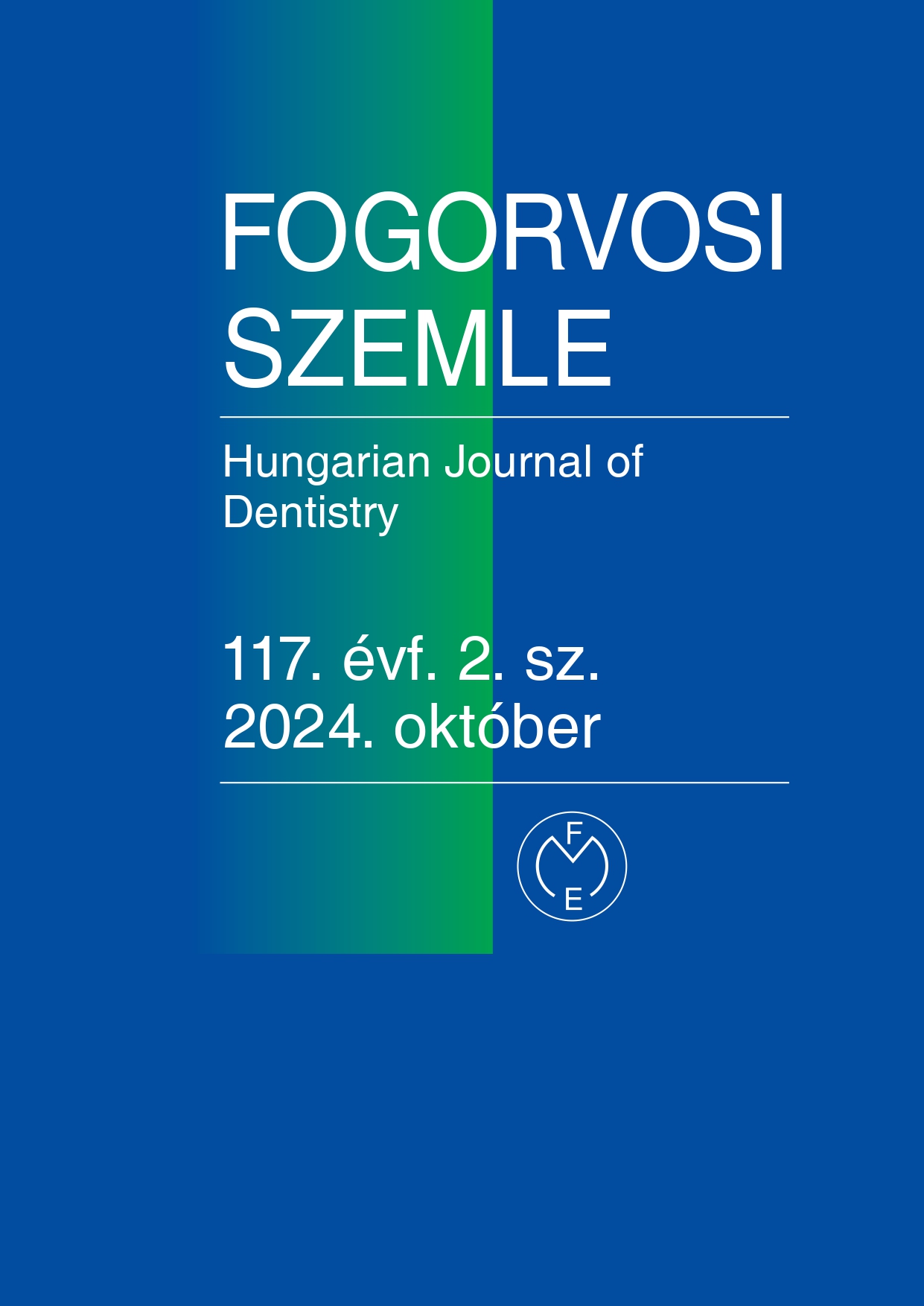Üvegszálas fogászati kompozit tömőanyag keménysége a gyökércsatornában: nanoindentációs vizsgálat
Előzetes tanulmány
Absztrakt
Bevezetés: A rövid üvegszál-megerősített kompozit (SFRC) anyagok használatával individualizált gyökércsapot készíthetünk a gyökérkezelt fogak megerősítésére (Bioblock technika). Kutatásunk célja, hogy nanoindentáció segítségével megvizsgáljuk az SFRC keménységét a Bioblock technika alkalmazását követően, különböző megvilágítási módok mellett.
Anyag és módszer: 20 gyökérkezelést szimuláló műanyag fogat használtunk kutatásunkhoz (1–4 csoport, n = 5/csoport). Valamennyi fogat SFRC anyag segítségével restauráltuk a gyökércsatornában (1–2 csoportot rétegezve, 3–4 csoportot bulk-fill módon). Az 1. és 3. csoportok esetén az SFRC megvilágítása üvegszálas csapon keresztül, míg a 2. és 4. csoportokban egy módosított fényforrással történt. A minták beágyazását és szekcionálását követően megmértük a kompozit anyagok keménységét, 2 mm-es távolságonként a gyökércsatornában (1., 2., 3. réteg, apiko-koronális irányba).
Eredmények: Az 1. és 2. réteg esetén az üvegszálas csapon keresztüli világítás (3. csoport) szignifikánsan nagyobb keménységet eredményezett a módosított fényvezetőn keresztüli megvilágításhoz (4 csoport) képest bulk-fill applikáció esetén.
Konklúzió: Az üvegszálas csapon keresztüli megvilágítás kiemelkedő keménységet biztosít az SFRC restauratív anyagnak az anyag bulk-fill applikálása esetén.
Hivatkozások
Khaled AL-Omiri M, Mahmoud AA, Rayyan MR, Abu-Hammad O: Fracture Resistance of Teeth Restored with Post-Retained Restorations. An Overview. Journal of Endodontics 2010; 36, 1439–1449. https://doi.org/10.1016/j.joen.2010.06.005
Dietschi D, Duc O, Krejci I, Sadan A: Biomechanical Considerations for the Restoration of Endodontically Treated Teeth: A Systematic Review of the Literature. Part 1. Composition and Micro- and Macrostructure Alterations. Quintessence Int 2007; 38, 733–743.
Scotti N, Scansetti M, Rota R, Pera F, Pasqualini D, Berutti E: The Effect of the Post Length and Cusp Coverage on the Cycling and Static Load of Endodontically Treated Maxillary Premolars. Clin Oral Invest 2011; 15, 923–929. https://doi.org/10.1007/s00784-010-0466-y
Seow LL, Toh CG, Wilson NHF: Strain Measurements and Fracture Resistance of Endodontically Treated Premolars Restored with All-Ceramic Restorations. Journal of Dentistry 2015; 43, 126–132. https://doi.org/10.1016/j.jdent.2014.10.001
Zicari F, Van Meerbeek B, Scotti R, Naert I: Effect of Fibre Post Length and Adhesive Strategy on Fracture Resistance of Endodontically Treated Teeth after Fatigue Loading. Journal of Dentistry 2012; 40, 312–321. https://doi.org/10.1016/j.jdent.2012.01.006
Trope M, Maltz DO, Tronstad L: Resistance to Fracture of Restored Endodontically Treated Teeth.
Dental Traumatology 1985; 1, 108–111. https://doi.org/10.1111/j.1600-9657.1985.tb00571.x
Le Bell-Rönnlöf A-M, Lassila LVJ, Kangasniemi I, Vallittu PK: Load-Bearing Capacity of Human Incisor Restored with Various Fiber-Reinforced Composite Posts. Dental Materials 2011; 27, e107–e115. https://doi.org/10.1016/j.dental.2011.02.009
Vallittu PK: Are We Misusing Fiber Posts? Guest Editorial. Dental Materials 2016; 32, 125–126. https://doi.org/10.1016/j.dental.2015.11.001
De Souza N, Marcondes M, Da Silva D, Borges G, Júnior LB, Spohr A: Relined Fiberglass Post: Effect of Luting Length, Resin Cement, and Cyclic Loading on the Bond to Weakened Root Dentin. Operative Dentistry 2016; 41, e174–e182. https://doi.org/10.2341/15-233-L
Faria-e-Silva AL, Pedrosa-Filho CDF, Menezes MDS, Silveira DMD, Martins LRM: Effect of Relining on Fiber Post
Retention to Root Canal. J Appl Oral Sci 2009; 17, 600–604. https://doi.org/10.1590/S1678-77572009000600012
Fráter M, Sáry T, Garoushi S: Bioblock Technique to Treat Severe Internal Resorption with Subsequent Periapical Pathology: A Case Report. Restor Dent Endod 2020; 45, e43. https://doi.org/10.5395/rde.2020.45.e43
Fráter M, Lassila L, Braunitzer G, Vallittu PK, Garoushi S: Fracture Resistance and Marginal Gap Formation of Post-Core Restorations: Influence of Different Fiber-Reinforced Composites. Clin Oral Invest 2020; 24, 265–227. https://doi.org/10.1007/s00784-019-02902-3
Forster A, Sáry T, Braunitzer G, Fráter M: In Vitro Fracture Resistance of Endodontically Treated Premolar Teeth Restored with a Direct Layered Fiber-Reinforced Composite Post and Core. Journal of Adhesion Science and Technology 2017; 31, 1454–1466. https://doi.org/10.1080/01694243.2016.1259758
Lassila L, Keulemans F, Säilynoja E, Vallittu PK, Garoushi S: Mechanical Properties and Fracture Behavior of
Flowable Fiber Reinforced Composite Restorations. Dental Materials 2018; 34, 598–606. https://doi.org/10.1016/j.dental.2018.01.002
Oliver WC, Pharr GM: An Improved Technique for Determining Hardness and Elastic Modulus Using Load and
Displacement Sensing Indentation Experiments. J Mater Res 1992; 7, 1564–1583. https://doi.org/10.1557/JMR.1992.1564
Fráter M, Sáry T, Molnár J, Braunitzer G, Lassila L, Vallittu PK, Garoushi S: Fatigue Performance of Endodontically Treated Premolars Restored with Direct and Indirect Cuspal Coverage Restorations Utilizing Fiber-Reinforced Cores. Clin Oral Invest 2022; 26, 3501–3513. https://doi.org/10.1007/s00784-021-04319-3
Fráter M, Sáry T, Néma V, Braunitzer G, Vallittu P, Lassila L, Garoushi S: Fatigue Failure Load of Immature Anterior Teeth: Influence of Different Fiber Post-Core Systems. Odontology 2021; 109, 222–230. https://doi.org/10.1007/s10266-020-00522-y
Fráter M, Sáry T, Jókai B, Braunitzer G, Säilynoja E, Vallittu PK, Lassila L, Garoushi S: Fatigue Behavior of Endodontically Treated Premolars Restored with Different Fiber-Reinforced Designs. Dental Materials 2021; 37, 391–402. https://doi.org/10.1016/j.dental.2020.11.026
Garoushi S, Säilynoja E, Vallittu PK, Lassila L: Physical Properties and Depth of Cure of a New Short Fiber Reinforced Composite. Dental Materials 2013; 29, 835–841. https://doi.org/10.1016/j.dental.2013.04.016
Copyright (c) 2024 Szerzők

This work is licensed under a Creative Commons Attribution 4.0 International License.


.png)




1.png)



